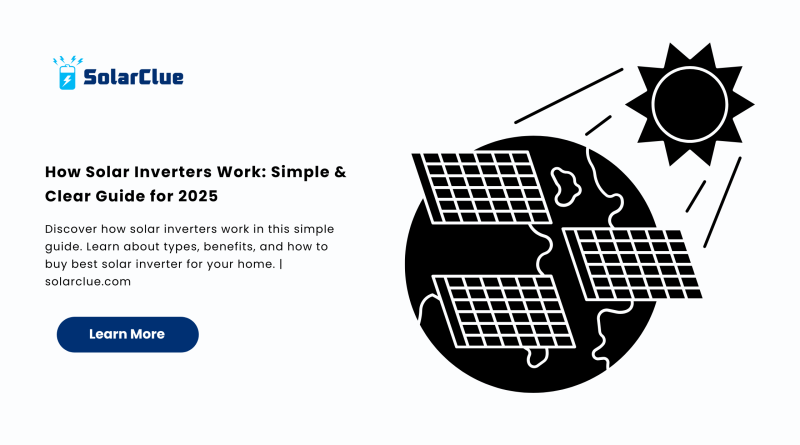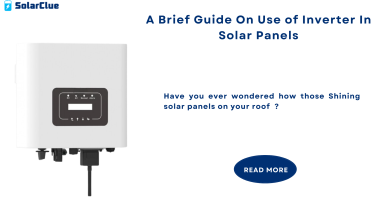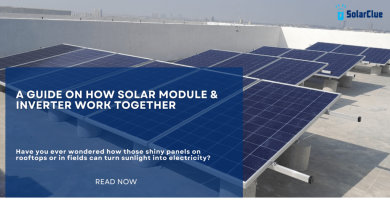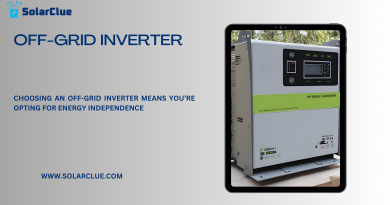How Solar Inverters Work: Simple & Clear Guide for 2025
As solar energy continues to reshape the way we power our homes and businesses, understanding the core component of a solar power system becomes essential. That core component is the solar inverter. But how does it work? Why is it so important? This guide breaks it down in the most humanized and digestible way, covering everything from functionality to choosing the best solar inverter for home use.
Table of Contents
- 1 What Is a Solar Inverter?
- 2 Why Are Solar Inverters Important?
- 3 How Do Solar Inverters Work?
- 4 Types of Solar Inverters
- 5 Best Solar Inverter for Home Use
- 6 Features to Look For in the Best Solar Inverter
- 7 Buy Best Solar Inverter: What to Consider
- 8 Solar Inverter Price in India
- 9 How Long Do Solar Inverters Last?
- 10 Common Solar Inverter Problems
- 11 Maintenance Tips for Solar Inverters
- 12 Can You Use Solar Power Without an Inverter?
- 13 Installing a Solar Inverter: DIY or Professional?
- 14 Benefits of Using the Best Solar Inverter
- 15 Conclusion
- 16 FAQs
What Is a Solar Inverter?
A solar inverter is a device that converts the direct current (DC) electricity generated by your solar panels into alternating current (AC), which is the form of electricity used by most household appliances. Without a solar inverter, your solar panel system would be unable to provide usable electricity to your home or the grid.
Why Are Solar Inverters Important?
The solar inverter acts as the bridge between your solar power system and your electrical appliances. Beyond just conversion, modern inverters manage power output, monitor performance, and even provide safety shutoffs during electrical faults. This makes them crucial for energy efficiency and system longevity.
How Do Solar Inverters Work?
Here’s a simple step-by-step explanation of how solar inverters operate:
- Solar panels absorb sunlight and generate DC electricity.
- This DC power flows to the solar inverter.
- The inverter converts it into AC power.
- This AC electricity powers your home’s electrical systems or is exported to the grid.
Types of Solar Inverters
String Inverters
These are the most common and cost-effective inverters. All solar panels are connected in a series, or “string,” and the inverter handles the entire array’s conversion process.
Microinverters
Attached to individual solar panels, microinverters optimize energy output per panel. This is ideal for rooftops with shading or orientation issues.
Hybrid Inverters
Hybrid inverters integrate solar power, battery storage, and sometimes even grid power. Perfect for those looking to go off-grid or enhance energy security.
Best Solar Inverter for Home Use
Choosing the best solar inverter for home depends on several factors: your energy needs, budget, location, and whether or not you use battery storage. Brands like Growatt, Luminous, and Delta are popular in India for reliability and efficiency.
Features to Look For in the Best Solar Inverter
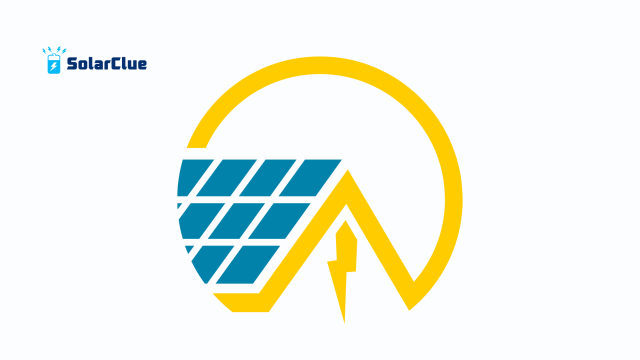
- Efficiency rating (typically 95%-98%)
- Compatibility with battery storage
- Built-in safety features
- Smart monitoring systems
- Warranty and support service
Buy Best Solar Inverter: What to Consider
When you’re planning to buy best solar inverter, make sure to:
- Compare solar inverter price and features
- Read real user reviews
- Check compatibility with your solar power system
- Consult a professional installer
For competitive deals and expert advice, you can check out solarclue.com for a range of inverters suited for Indian homes.
Solar Inverter Price in India
The solar inverter price can vary based on type, capacity, and brand:
- String Inverters: INR 15,000 – INR 50,000
- Microinverters: INR 8,000 – INR 20,000 per panel
- Hybrid Inverters: INR 50,000 – INR 1.5 Lakh
Visit blog.solarclue.com for updated inverter price trends and reviews.
How Long Do Solar Inverters Last?
Most solar inverters have a lifespan of 10 to 15 years. Hybrid inverters with battery integration may have slightly shorter lifespans due to additional load, but warranties often cover up to 10 years.
Common Solar Inverter Problems
- Overheating
- Faulty wiring or installation
- Firmware issues
- Grid disconnection
Proper installation and regular maintenance help avoid these problems.
Maintenance Tips for Solar Inverters
- Keep it dust-free and shaded
- Check the display panel for alerts
- Update firmware regularly
- Annual professional servicing
Can You Use Solar Power Without an Inverter?
Technically yes, but the electricity generated would be unusable by standard appliances. A solar inverter is essential to make solar power usable in any modern home.
Installing a Solar Inverter: DIY or Professional?
While DIY installation kits exist, it’s highly recommended to use certified professionals. This ensures system safety, warranty validation, and optimal performance.
Benefits of Using the Best Solar Inverter
- Efficient power conversion
- Lower electricity bills
- Enhanced safety and control
- Better return on investment
Conclusion
Now that you understand how solar inverters work, you’re better prepared to make informed decisions when setting up your solar power system. The right solar inverter can dramatically improve energy efficiency and reliability. Ready to make the switch? Explore top-rated options on solarclue.com and dive deeper into solar innovations at blog.solarclue.com.
Power your future the smart way—visit our website and let the sun do the heavy lifting!
FAQs
1. What is the main function of a solar inverter?
It converts DC electricity from solar panels into AC electricity usable by household appliances.
2. How to choose the best solar inverter for home use?
Look at energy needs, inverter efficiency, compatibility, and budget.
3. What is the average solar inverter price in India?
Prices range from INR 15,000 to INR 1.5 Lakh depending on type and capacity.
4. Are hybrid inverters better than string inverters?
Hybrid inverters offer more flexibility and battery integration, but are generally more expensive.
5. Where can I buy best solar inverter online?
Check out solarclue.com for trusted options and expert support.

